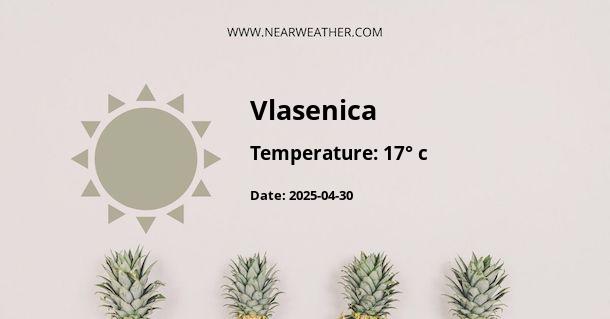Climate and Weather in Vlasenica, Bosnia and Herzegovina
Vlasenica is a town situated in the northeastern part of Bosnia and Herzegovina, known for its continental climate with significant variations between seasons. Understanding the climate dynamics of Vlasenica can aid visitors and inhabitants alike in planning activities throughout the year. This article delves into the meteorological patterns that characterize Vlasenica, offering insights supported by statistics and expert opinion.
Geographical Influence on Climate
Geographically, Vlasenica is nestled within inland Bosnia and Herzegovina, producing a climate that is subject to continental influences. The proximity to mountains and the absence of nearby large bodies of water contribute to the area's distinctive weather patterns, marked by cold winters and warm summers.
Seasonal Climate Overview
Winter
The winter months in Vlasenica are generally cold, with temperatures that frequently plunge below freezing. Snowfall is common, contributing to the region's popularity among winter sports enthusiasts.
Average Winter Temperature:
- December: -3°C to 3°C
- January: -5°C to 1°C
- February: -3°C to 4°C
Snowfall accumulations can significantly impact travel and daily life, making winter preparations an essential aspect for locals. During severe winter conditions, Vlasenica may experience snow depths exceeding 50 centimeters, necessitating efficient snow removal operations.
Spring
Spring brings a gradual increase in temperature and a corresponding uptick in precipitation. The melting of winter snows combined with seasonal rainfall can lead to heightened water levels in local streams and rivers, occasionally posing a risk for flooding.
Average Spring Temperature:
- March: 1°C to 10°C
- April: 5°C to 15°C
- May: 9°C to 20°C
Spring is characterized by the reawakening of flora, with a lush display of greenery transforming the landscape by the end of May. This period is optimal for agricultural activities, as the fertile soil of the region supports a variety of crops.
Summer
The summer months in Vlasenica are warm, with temperatures occasionally reaching into the high 20s or low 30s degrees Celsius. This is also the period when Vlasenica experiences its highest concentration of tourist activity.
Average Summer Temperature:
- June: 13°C to 25°C
- July: 15°C to 27°C
- August: 14°C to 26°C
Summer weather is conducive to exploring the outdoors, and the natural beauty of Vlasenica becomes a backdrop for hiking, cycling, and other recreational activities.
Fall
The autumnal months see a progressive cooling of temperatures and an increase in precipitation. This season is marked by the picturesque changing colors of leaves, but cooler temperatures and unpredictable weather can present challenges.
Average Autumn Temperature:
- September: 10°C to 20°C
- October: 5°C to 15°C
- November: 1°C to 9°C
Rainfall during fall can be sporadic and, occasionally, intense, necessitating adequate drainage and flood prevention measures.
Annual Precipitation and Weather Extremes
Annual precipitation in Vlasenica varies, but it is common for the area to receive upwards of 800-1000 millimeters of precipitation throughout the year. Weather extremes, including summer heatwaves and winter cold snaps, are less frequent but can have significant implications for the municipality, affecting everything from agriculture to infrastructure.
- Average Annual Precipitation: approximately 900 mm
- Maximum Recorded Temperature: around 38°C in summer periods
- Minimum Recorded Temperature: approximately -25°C during winter
Climate Data Analysis
Climate studies and models indicate that Vlasenica's weather patterns are susceptible to broader climate change phenomena. Researchers predict that the area may experience increased temperatures and altered precipitation patterns in the long term. These projections are vital for local policymakers to consider in their future planning to mitigate potential climate impacts.
"Climate resilience is becoming an increasingly important factor in the sustainable development of municipalities like Vlasenica. Proactive measures in response to changing climate conditions are not just advisable; they are necessary for the community's long-term well-being." - Local climate expert
Coping with Seasonal Variations
To manage the seasonal variations, Vlasenica's local government and community organizations implement a variety of strategies, such as maintaining robust heating systems for the cold winters and preparing water conservation measures during dry summer periods. Investing in infrastructure that can withstand extreme weather conditions forms a cornerstone of the town's climate adaptation strategies.
Conclusion
In conclusion, Vlasenica, with its continental climate, experiences a range of weather conditions throughout the year. From the cold, snowy winters to the warm, sunny summers, the town offers a variety of climates that cater to different activities and lifestyles. Understanding these climatic nuances can greatly benefit planning for individuals and businesses alike.
As we continue to witness shifts in global weather patterns, it's crucial for regions like Vlasenica to carefully monitor climate data and adapt accordingly. The municipality's efforts to improve climate resilience not only safeguard the local community but also ensure that Vlasenica remains a vibrant and thriving place for generations to come.
A - Vlasenica's Latitude is 44.181938 & Longitude is 18.940559.
A - Weather in Vlasenica is 17° today.
A - Climate Conditions in Vlasenica shows clear sky today.
A - Humidity in Vlasenica is 56% today.
A - Wind speed in Vlasenica is 7.38 km/h, flowing at 55° wind direction. today.
